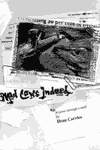Douglas Rushkoff, �Media Virus! � Hidden Agendas in Popular Culture�
When you�re a media junkie like myself, and more important, a media junkie who likes to read books that criticize the media, you begin to notice a lot of nepotism. How many people are going to mention the fact that the FCC mandate says the airwaves belong to the people, yet the people have no control over the airwaves? How many times am I going to see the same Chomsky books referenced? Is there any new way to say the system is fucked up that doesn�t sound like a Crass or Dead Kennedy lyric?
Well, yes and no. Rushkoff, for his part, has managed to throw some new tricks into an old dog. At the same time, however, I sometimes couldn�t help feeling that I was a little sick of this particular dog. Rushkoff (author of The GenX reader � not to be confused with Generation X) looks into the world of the mass-market media and subversion and manipulation into our fragile little minds.
Big surprise there.
For instance, one chapter goes into the realm of MTV, speaking of Madonna and Michael Jackson�s ability to use the medium to reinvent their tired old personas which probably wouldn�t have been possible pre-music videos (hey, this was published in 1996 � don�t blame me for the dated material).
But he really seems to have missed the insidious nature of networks like MTV. And I probably would have missed it as well if I hadn�t been privy to a special presentation on mass marketing for the network in terms of demographics.
The presentation occurred during an Associated Press Managing Editors convention. Titled, �Thinking Outside the Box�, they featured several companies who had succeeded in luring in new customers with unorthodox strategies. The MTV spokesperson came on shortly after the Joe Boxer representative. What followed was a typical glory presentation of MTV�s conception and inception, and their subsequent success story, glossing over things like their racist policy at their early inception of not showing videos by black artists (which Rushkoff mentions, but only briefly).
The first thing I noticed was that the speaker, Michael Cunningham, failed to speak of the average MTV watcher as a �fan,� or a �viewer,� or even a �person.� No, in Cunningham�s world a person watching MTV was a consumer, or a number, or a demographic.
I�m sure other presenters used these same terms, and it�s possible that I simply failed I failed to notice the meaning behind the language. But as I was soon to discover, the worst was yet to come. While Cunningham talked about the successes of MTV, he capitulated and told about how they had almost become too arrogant in their status, and was almost destroyed because of it.
Rushkoff speaks of this period as well, where MTV executives thought they could coast an easy ride to ratings super-stardom being little more than a service provider for the record companies. But the audience (sorry, consumers) revolted against such cheap chicanery, and the marketing department of MTV went into high gear to regain their selected demographics.
This, Cunningham explained, was achieved by reinventing the very format that had made them so popular in the first place. An early success was The Real World, one of the first reality programs to air on television. Other innovations included utilizing what Rushkoff called the �appearance of interaction� with game shows, Spring Break free concerts, festivals, parties and live call-in request shows. Their plan worked, and MTV once again permeated the market.
�But,� said Cunningham from his podium, �with all our successes, we have to be wary of the future and its velocity for change keeping in mind how to maintain the illusion of cutting edge programming.
�We at MTV� he continued, �recognize that we do not have total saturation of the youth market. In fact, there are approximately 20 percent of the population that do not watch our network. We have studied the demographics and psychographics of these people that [as opposed to who] have not come into the fold. We have divided these people into three subsections and are currently working on ways to lure these factions to our product.�
Cunningham first described the interests and actions of my crazy ex-girlfriend, who at the time was still my crazy girlfriend. I thought this was pretty funny, because I knew I could go home after this and kid her that the MTV bogeyman was out to get her. Next he described Mr. Sleepy, my photographer partner, and I pointed at him in mock laughter, whispering �you�re next!� at his horrified face.
And then he described me.
I don�t mean he described me physically, although I�m sure if pressed he probably could have. He did, however, describe my hobbies, my interests, my political and social views, my general outlook on life, even my shopping habits and sense of humor.
I�m not a stranger to target marketing. I know how the system works. But I never saw how precise it could be when done correctly, and to be frank, I was furious. I wondered how much trouble I would get into if I started a fight at the Disneyland hotel.
But really, should I have been surprised? No, I was just shocked to see it spelled out in such a blatant fashion. That�s how this book works. Is it a revelation to read about Clinton�s coup by appearing on MTV and Arsenio Hall and looking hip to a league of jaded potential voters? Hardly.
Should I be surprised children�s cartoons are a front for the video game, action figure and sugar cereal industries? Not really.
And should I trust a media expert who quoted some lyrics out of context and misspelled the name of Krusty on The Simpsons, on the updated version, no less? Probably not.
Surprisingly, the two sections that seem like they would be the most interesting � �Pranks� and �the Net� � come across with the least amount of useful information, instead only offering anecdotes, and only mildly amusing anecdotes at that.
Perhaps I�m a little too harsh, but for me, this book is a lot of been there, read that. The bottom line is this is a good starter book for those who are interested, and since it is more reader friendly than many cultural criticism studies, it might make a good gift for those who haven�t been introduced to the dark side of marketing.

